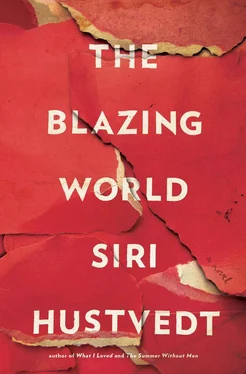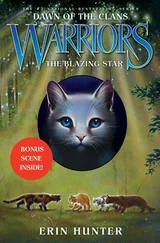When I returned from my walk, I found Ethan lying on the lower bunk bed with the notebook beside him. He turned to look at me, and I saw Mother. That moment of startling recognition lasted only seconds, but I saw my mother in my brother, and then she disappeared just as quickly as she had appeared, but it shook me up a little. I sat down beside Ethan, put my hand on his arm, and waited to hear what he thought. He looked over at me and said, “I like the writing.” I burst out laughing. I think I was relieved. I hadn’t thought about aesthetics at all. Ethan went on to say that he admired the way our mother shifted person from first to second to third. She made it look easy. I told my brother that I loved him. He nodded. When I send Ethan an e-mail I always sign it “Love, Maisie” or “Love and kisses, Maisie” or “Your loving sister, Maisie,” and he signs his “Ethan.” That’s how it’s always been and that’s how it will always be. I’m used to it. Ethan said that some entries in the notebook had to be included in the book, and he would scan the material and call Professor Hess right away before it was too late.
I thought we should think about it carefully, weigh the pluses and minuses. I wanted to know if he didn’t find the entries upsetting, creepy, in fact. He said yes, but we were talking about our mother’s legacy, her work as an artist. This notebook, Ethan insisted, explained the mystery of Richard Brickman. He believed “Harriet” would have wanted the story of that pseudonym told. Brickman was yet another of our mother’s alter egos, part of a larger narrative. In the end, Ethan convinced me he was right.
I asked Ethan which sinners were in Dante’s fifth circle of the Inferno , because I had forgotten. The wrathful and sullen, he said, Cantos VII and VIII. The wrathful and sullen are doomed to wallow in the filth and the stench and the fetid air of the river Styx. Ethan has a wonderful memory for books. He says that often, not always but often, he can see the page and the page number in his mind and sometimes read off the passage. He couldn’t do it this time, but he knew that Virgil and Dante meet the Furies, who call on the Medusa to come and turn Dante into stone. She doesn’t do it, of course. Had she succeeded, the poem would have been over. Rune turned my mother to stone, for a while, anyway. I hate him for it. I hate him still, even though he’s dead. And I understand Mother’s anger, her rage, her fury. Inside the cover of Notebook O, I found these words: “Let go upon this man the stormblasts of your bloodshot breath, wither him in your wind, after him, hunt him down once more and shrivel him in your vitals’ heat and flame.”
Those terrible words are from Aeschylus, The Eumenides , the third play of the Oresteia . Orestes has killed his mother, Clytemnestra, and in the play, the murdered woman’s ghost eggs on the furies to avenge her death, to punish the matricide.
Mother still comes to me in my dreams. She is always a ghost now. In the two years or three years after she died, she used to come to me as her old living self, and I would rush toward her and, a couple of times, she took me in her arms and held me, her lips pressed against my neck, and the sensation was warm and happy. But then she began to recede, and now, when I dream of her, I know she is a phantom, a dead person, and I cannot reach her. She is often rattling around in her old studio in Red Hook or making mime-like gestures at me that I cannot interpret. Just a few days ago, I dreamed that she walked into my bedroom at home. She was completely transparent, a real old-fashioned ghost, and when I called out to her, she turned in my direction, extended her arms, and opened her mouth. I could see way down into her lungs, and I heard her breathe once, and then the whole room was on fire. I wasn’t afraid of the blaze in the dream, and I didn’t try to speak to her. I just stood by quietly and watched the room burn.
Bruno Kleinfeld (written statement)

My epic poem. Harry’s grand experiment. Neither one of us could heave the darlings overboard. I sequestered the Meisterwerk over in my slummy digs, which I had retained for the sake of my manly independence, and brought out the twenty-pound MS. (stored in the closet on the shelf above three retired baseball mitts) for brush-ups, revisions, cuts, and additions, unbeknown to Harry, who listened joyfully to MS. #2, the ever-growing Confessions of a Minor Poet , the mostly true tale of one Bruno Kleinfeld, a moody Jewish fornicator from the Bronx, whose adventures hewed closely to mine but were blessed with the gap that inevitably arrives between present-self scribbler and his various tawdry or gallant past selves, a chasm also known as humor, irony, or forgetfulness. I salute Harry for kicking my ass, which in turn loosened up my old knuckles for work on the Olivetti’s sleek keyboard, a machine inherited from dear old Uncle Samuel Kleinfeld in 1958. The story of my life, such as it was, seemed to arrive easily and breezily, a saga of, among other things, cream sodas, gefilte fish, and Doris McKinny’s maddeningly distracting breasts, which were allowed three pages to themselves once I arrived at puberty on page 101.
I am not alone in observing that autobiographies lose interest when the hero leaves his youth, so I decided to give my middle age short shrift: twenty-five pages devoted to my all-around failures as poet, husband, and father delivered in a mock-heroic tone to relieve the reader of realism or maybe naturalism — whatever that grubby genre of rusty sinks and honest squalor is called. After that truncated interim, I arrived at my three grown-up girls, and the noblest of all my seminal offshoots, my grandson, Bran. Yes, my Confessions are shaped like an hourglass. The form of my time on earth eschews the middle for its fat ends, early and late. Bran came squalling into my life as an ugly red-faced little bruiser, but as I write these words, he is running around the diamond and kicking a soccer ball and explicating the ins and outs of avatars to me, and has become, I must say, the shining light of his granddad’s dotage.
The very day after Harry lay on her back and told me the tale of her visit to Rune in a voice as cold as steel in winter, I noticed that her thoughts had been tinted by or maybe sprinkled with paranoia. Harry knew she had struck a Faustian bargain, had made a soul-killing exchange, which had been fraught with risk from the beginning. Rune, once the great white hope, had turned into Beelzebub. She worried that the dead spouse had shared intimate stories with his young “friend.” Hadn’t Rune seemed possessed of an uncanny knowledge of her from the start? Rune’s cleverness began to look paranormal. When Harry loudly proclaimed that four of her works were missing from her studio, my guess was that one of the assistants had mislaid them under a mountain of ready-mades. Between her stints of depth cleaning, Harry let congenial chaos reign in the studio. Arms, legs, heads, wigs, and hairpieces littered the floor. Stacks of lumber, sheets of glass, coils of rope, wire, cable, tools, and mystery machines lined the walls. In one corner, Harry stockpiled “notable dross,” an unsavory collection she had hauled inside from the general vicinity of the docks, various thingamabobs and whatsits that had moldered, withered, languished, or rusted into states so crumbled, mottled, decayed, or lumpish their former identities were no longer with us. Keep looking, I said. Maybe they’re hidden under the notable dross.
But Harry blamed Rune for the missing works. She insisted he had broken through multiple locks and an alarm system to snatch her art. I jokingly asked Harry if she hadn’t mixed up Rune with the Barometer’s fallen angel, a tall man with wings who flew in and out of the lodge as he pleased. It’s just not possible, Harry, I said, but she wouldn’t believe me. One night, her face quashed with misery, she whispered to me, “He’s climbed inside me, Bruno. He’s seen the fear. He knows more than I know.” I hated the S.O.B., but I knew he was human.
Читать дальше













